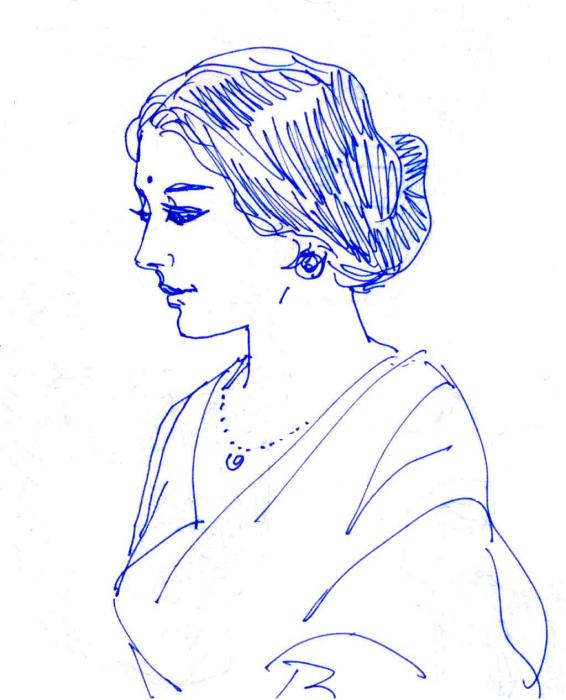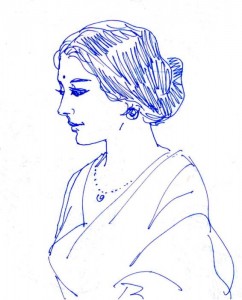Right to Education, Midday Meal Scheme, Janani Suraksha Yojana – our governments have come up with an incredible number of programmes aimed at bettering the status of women, but we have not made much real progress. Illiteracy levels continue to be high, and the socio-economic status of women leaves much to be desired for. What, do you think, is the biggest impediment?
Putting things in perspective, we need to realise that the more economic growth/development fails to generate gainful and decent employment, the longer it fails to be inclusive overall, the more that the government of the day will need to resort to welfare programmes and entitlements such as the above. Unless and until poverty and illiteracy elimination become integral parts of the growth paradigm as in Cuba, politically, we will be forced to continue with the above; and however well they are implemented, their impact will be minimal since such schemes/programmes, of themselves, cannot address the larger issues of unemployment/underemployment and/or decent employment of men/women/households, which is what is required to empower people to take hold of their lives.
We have made attempts, through reservation, to bring more women into politics. What potential does this hold? How far have we come, and do you think there are noteworthy successes anywhere?
The 73rd Amendment to the Constitution to bring in women into Local Bodies has without doubt made a tremendous difference despite a range of criticisms, which however are neither unfounded nor insurmountable. What is to be considered as ‘noteworthy successes’ is relative and depends on the context. For example, areas where NGO presence is strong, handholding of women representatives by the NGOs has enabled these women to withstand several forms of backlash that such an amendment to the Constitution has brought about in local level politics; where such handholding process has been weak or non-existent, it has been left to individual woman or communities of women to face the situation with mixed results. But what is noteworthy is that however strong or inimical the patriarchal structure on the ground, it has had to contend with the fact that this amendment to the Constitution opening the doors for large numbers of women to participate in local level politics has come to stay. In my opinion, it is this realisation that has made political parties across the spectrum to unite and stall the entry of women into Parliament.
You had mentioned at a talk at TISS, Mumbai that despite literacy among non-working women being higher than literacy among working women, it is not translating to organised employment opportunities in the formal sector. This is a disturbing trend considering we tend to hail education as a very important component of the solution for alleviating poverty. What are your comments on this scenario?
My observation regarding divergence in formal education and employment in the case of women and particularly urban women was based on analysis of Census data. The observed pattern indeed is disturbing. But as yet we have no credible large scale research to help us comprehend why this is happening. It is hoped that the Central Statistical Organisation will conduct a large scale survey across the country specifically to net reasons why the proportion of educated women in the labour force is not increasing. Till then students could be encouraged to undertake micro level studies covering some of the urban areas of the country.
Do you think that through a number of policies that do aim to do good, the state is unconsciously reinforcing gender stereotypes and contributing to women’s subordination?
It could be conscious also. Not just the state but a lot of us fall into the trap of suggesting measures ostensibly to help women but end up reinforcing stereotypes and essentializing women’s and men’s roles in society. Just to give an example: only till the lactating period do you need a crèche facility at the mother’s place of work. Beyond the lactating period, the crèche could as well be at the father’s place of work. But how many of us demand that crèche facilities be provided at men’s place of work too?
As women try to negotiate their roles in the society, perhaps aided by developmental activities that seek to empower them, what structural changes occur? How is our society reacting to these changes?
Personally speaking, between late eighties [when I began researching on women’s issues] and now, some structural changes are starkly visible but I am not sure how much society has changed to acknowledge and address this structural change. To give an example: the Hindu society provides a religious reason for its son preference. In the last two decades, it is quite visible to anyone with open eyes and mind, that large numbers of sons have migrated abroad and are generally not available to perform their function of either looking after their elderly parents or the last rites of their parents that their religion ordains them to do. This growing fact and realisation is however not translating into diminished emphasis on son preference. A different but equally important phenomenon is the growing assertion by hitherto marginalised members of our society, women included. Rather than reading this phenomenon positively, our patriarchal and hierarchy-ridden society either blames it on ‘feminism’[which it sees as Western and therefore alien to Indian society] and/or poses the problem as one of the ascendancy of non-merit over merit. In short the current structure of our society is not willing to let go of its privileges and squarely recognise that it can no longer continue to perpetrate the kind of social, including gender, injustice that it has practiced all these years.
[box type=”download”] If you have trouble opening the PDF, please right click on the button and select ‘Save Link As/Save Target As’. This will help save the PDF to your computer. If you still have trouble, drop us a mail at editors@sparkthemagazine.com and we will mail you the PDF straight to your inbox! DON’T MISS THE PDF EXPERIENCE![/box] [button link=”http://www.sparkthemagazine.com/wp-content/uploads/2012/05/spark-may-2012.pdf” newwindow=”yes”] Click here to download the May 2012 issue as a PDF![/button] [button link=”http://issuu.com/sparkeditor/docs/spark-may-2012?mode=embed&layout=http%3A%2F%2Fskin.issuu.com%2Fv%2Fcolor%2Flayout.xml&backgroundColor=000000&showFlipBtn=true” color=”green” newwindow=”yes”] Click here to flip and read the May issue like a magazine![/button]
[facebook]Share[/facebook] [retweet]Tweet[/retweet]









